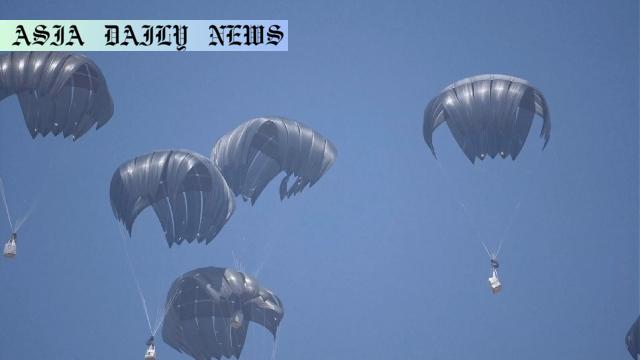Aid Airdrop: Jordan and UAE airdrop 25 tons of supplies in Gaza during Israel’s temporary halts in military operations.
Jordan and UAE successfully airdrop 25 tons of humanitarian aid into Gaza.
Israel announced temporary halts in military operations to facilitate safe aid delivery.
The decision follows global pressure over increasing deaths and starvation in Gaza.

Jordan and UAE Deliver Critical Aid to Gaza Amid Conflict
A humanitarian milestone was reached as Jordan and the United Arab Emirates (UAE) conducted a joint effort to deliver 25 tons of aid to the Gaza Strip. This significant contribution comes amidst heightened tensions and humanitarian concerns surrounding the enclave. As the conflict between Israel and Hamas continues, the airdrop was strategically planned to coincide with temporary halts in Israeli military operations. These pauses, announced by Israeli authorities, aim to create opportunities for residents to receive critical supplies in specific areas of the region.
Israel’s Temporary Ceasefires Fuel Aid Flow
Israel declared a temporary suspension of its military operations during specific hours in areas heavily populated by evacuees. This gesture allows humanitarian corridors to be accessible and safe, paving the way for entities like the United Nations and other NGOs to deliver essential provisions. In addition to the airdropped supplies, truckloads of aid have been arriving at the Rafah crossing, the sole link between Gaza and Egypt. While the pause in operations brings hope, it is clear that more sustainable measures are needed to address the deepening crisis in Gaza.
Global Concerns Over Growing Humanitarian Catastrophe
The international community has expressed escalating outrage over the deteriorating conditions in Gaza. Reports of starvation, lack of basic medical access, and fatalities among civilians have alarmed governments worldwide. Jordan and the UAE’s combined initiative demonstrates a renewed focus on alleviating these conditions, but experts warn that 25 tons of aid can only temporarily address the regional shortages. The need for consistent delivery mechanisms and prolonged ceasefires remains crucial for sustainable relief and recovery efforts.
The Human Toll in Gaza’s Conflict
The human toll continues to mount, as reflected by local reports from Al Jazeera detailing an Israeli attack on a house in northern Gaza, which tragically claimed the lives of a mother and her four children. This account underscores the dire situation on the ground, further emphasizing the need for international cooperation to mitigate the crisis.
Continued Tensions and Israel’s Stance
Israeli Prime Minister Benjamin Netanyahu has reaffirmed the country’s commitment to dismantling Hamas and securing the release of hostages. Meanwhile, as negotiations take place, the Israeli government faces intense scrutiny over its restrictions on aid access. The precarious balance between military objectives and humanitarian obligations remains a contentious point on the global stage.
The Path Forward: Challenges and Opportunities
Addressing the humanitarian catastrophe in Gaza requires more than sporadic aid deliveries. It necessitates sustained dialogue, international monitoring, and long-term cooperation between conflict stakeholders. Only through collective international efforts, such as Jordan and the UAE’s initiative, can a pathway to peace and stability be envisioned. The humanitarian crisis, while urgent, also serves as a stark reminder of the cost of prolonged conflict and the need for immediate and concerted relief measures.



Commentary
Hope Amid Chaos: A Reflection on the Aid Effort
The recent airdrop of 25 tons of humanitarian aid by Jordan and the UAE into Gaza symbolizes a glimmer of hope amidst one of the most challenging humanitarian crises in recent history. While the aid offers immediate relief, it also brings into sharp focus the desperate plight of those living in Gaza. With every passing day, civilian casualties and stories of suffering highlight the urgent need for robust international intervention.
Israel’s Ceasefire: A Temporary Solution?
Israel’s decision to temporarily halt military operations in certain areas raises many questions. While it allows for vital aid to reach those in need, the sporadic nature of these ceasefires underscores the larger issue: a dearth of sustained commitment to resolving the underlying conflict. Dialogue and negotiation must remain key priorities for all stakeholders to ensure the safety and well-being of innocent civilians, many of whom remain vulnerable amidst the chaos.
Global Responsibility and the Cost of Inaction
The global community’s response to the crisis in Gaza will be remembered for its effectiveness—or lack thereof—in addressing one of the most pressing humanitarian emergencies of our time. Although nations such as Jordan and the UAE deserve praise for their initiative, their contributions also serve as an implicit criticism of the broader inaction witnessed from other governments. The international response must extend beyond momentary pauses, airdrops, or statements of solidarity. It must involve proactive, systemic solutions that address both immediate and long-term needs.
The Need for Sustainable Peace
Ultimately, peace cannot be achieved through militarization or sporadic aid. A solution must be forged through dialogue, compassion, and sustained international commitment. The humanitarian disaster in Gaza is a stark reminder of the human cost of conflict, and the world must not turn a blind eye. The onus lies on global powers, regional governments, and civil society to unite and create a future where such tragedies are no longer a recurring chapter in history.